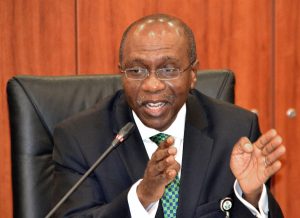
By Kadiri Abdulrahman
A financial expert, Prof. Uche Uwaleke, says the Ways and Means Advances of the Central Bank of Nigeria (CBN) to the Federal Government is strictly within the purview of the apex bank.
Uwaleke, a Professor of Capital Market at the Nasarawa State University, Keffi said this in an interview with the News Agency of Nigeria (NAN) on Saturday in Abuja.
He spoke against the backdrop of effort to securitise the pending N22.7 trillion Ways and Means Advances, approval of the process by Senate and the role of the Debt Management Office (DMO).
According to Uwaleke, the DMO had no role because the Ways and Means were completely under the control of the CBN.
He said that the DMO could only have played advisory role when necessary.
The much the DMO could have done would have been to include the CBN overdraft to the FG as part of the countrys domestic debt stock.
This will enable the DMO issue early warning signals whenever the Ways and Means limit as stimulated in the CBN Act was being breached, he said.
NAN reports that the Ways and Means provision allows the federal government to borrow from the CBN if it needs short-term or emergency finances.
This is to enable the government to fund expected cash receipts of fiscal deficits.
The Nigerian Senate had, on Wednesday, approved the request of President Muhammadu Buhari to restructure the advances through securitisation.
Based on statutory provisions, however, the approval of the Senate and the House of Representatives are required for securitisation.
Implementation can, thus, only be upon concurrent approval of the House of Representatives.
Uwaleke, however, explained that securitisation of the N22.7 trillion Ways and Means Advances would afford the Federal Government a breather in terms of debt service burden.
According to him, this is in view of the fact that repayment of the N22.7 trillion will now be spread over 40 years with a three year grace period on the principal sum.
In respect of the securitisation of the Ways and Means, the government debt restructuring arrangement affords it a breather in terms of debt service burden.
Similarly, the cost of annual debt service will reduce given the concessional rate of nine per cent as against the current 20.5 per cent interest rate charged on CBNs Ways and Means.
The cumulative effect of these would be a reduction in government budget deficit and freeing up resources that could be applied to more productive areas, he said.
According to him, since the securities will only be taken up by the CBN and not the public, the fear that it will crowd out the private sector is no longer there.
There is equally the issue of debt transparency that it engenders.
Before now, CBNs Ways and Means did not form part of the public debt stock reported by the Debt Management Office.
Securitisation would entail including it as part of the countrys public debt which makes for transparency he said.
He said that, henceforth, adequate safeguards should be put in place to ensure that CBNs Ways and Means were curtailed due to its negative impact on the general price level.
The relevant provisions of the CBN Act should clearly stipulate the conditions under which debt limits can be breached.
The process should involve approval by the National Assembly as well as stiff sanctions for breach of the limits provided in the Act without following due process, he said.
According to Okechukwu Unegbu, a past president of the Chattered Institute of Bankers of Nigeria (CIBN), the Ways and Means Advances constitutes money that has already been appropriated by the Federal Government.
It is important to note that the Federal Government does not need the DMO to obtain such facilities from the CBN.
It does so directly, and sometimes, it entails the printing of money.
The DMO will only be required to record it as debt after it is securitised, he said.
NAN reports that the CBN is legally authorised to issue Ways and Means Advances to the Federal Government according to Section 38 of the CBN Act, 2007.
The N22.7 trillion Ways and Means Advances, therefore, do not represent new borrowings, but overdrafts by the CBN to the Federal Government.
The advances is statutorily managed by the Ministry of Finance and the Office of the Accountant-General in the Consolidated Revenue Fund where it is domiciled.(NAN)(www.nannews.ng)
=========
Edited by Isaac Aregbesola
Source: NAN News